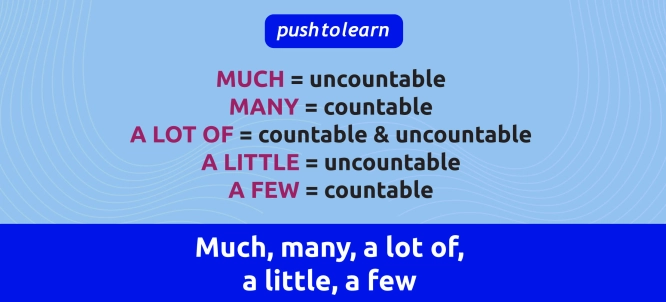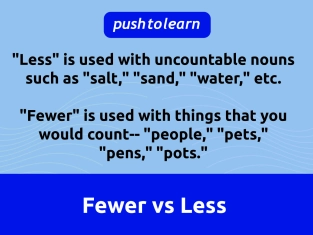by PushtoLearn
Much, many, a lot of, a little, a few
Table of Contents
Much, many, a lot of, a little, a few - Exercise and Quiz
These exercises focus on much, many, a lot of, a little, a few
Countable and Uncountable Nouns
Before we dive into these words, let’s quickly review countable and uncountable nouns:
-
Countable nouns can be counted one by one, like "apple," "car," or "book."
-
Uncountable nouns cannot be counted individually, like "water," "sugar," or "advice."

Rules for "Much," "Many," "A Lot of," "A Little," and "A Few"
Here’s a guide for using each word:
|
Word |
Used with |
Examples |
|
Much |
Uncountable nouns |
"I don’t have much time." |
|
Many |
Countable nouns |
"There are many people at the party." |
|
A Lot of |
Countable & Uncountable nouns |
"There is a lot of food." / "I have a lot of books." |
|
A Little |
Uncountable nouns |
"She has a little money left." |
|
A Few |
Countable nouns |
"He has a few friends in the city." |
1. Much – Used with Uncountable Nouns
We use much when talking about large amounts of something that can’t be counted individually. Much is commonly used in questions and negative sentences.
Examples:
"How much water do you need?"
"There isn’t much milk left in the fridge."
2. Many – Used with Countable Nouns
Many is used for a large number of countable items. Like much, many is often used in questions and negative sentences.
Examples:
"How many apples are in the basket?"
"I don’t have many friends here."
3. A Lot of – Used with Both Countable and Uncountable Nouns
A lot of can be used with both countable and uncountable nouns and is generally used in positive sentences to indicate a large quantity.
Examples:
"I have a lot of work to do today." (Uncountable)
"There are a lot of people in the park." (Countable)
4. A Little – Used with Uncountable Nouns
A little is used with uncountable nouns to talk about a small amount of something. It can be positive, suggesting “some,” even if it’s not a large amount.
Examples:
"She has a little patience with her younger brother."
"There is a little water in the glass."
5. A Few – Used with Countable Nouns
A few is used with countable nouns to indicate a small number, which is usually enough but not many.
Examples:
"I have a few questions about the assignment."
"They visited a few countries on their trip."
Common Mistakes and Tips
-
Using "much" and "many" with the wrong nouns:
-
Mistake: "There are much books on the shelf."
-
Correction: "There are many books on the shelf."
-
Mixing "a little" and "a few":
-
Mistake: "I have a few sugar for the recipe."
-
Correction: "I have a little sugar for the recipe."
-
Overusing "a lot of":
-
While a lot of is very versatile, try to use much or many in questions and negative sentences:
-
Correction: "There aren’t many cars on the road," not "There aren’t a lot of cars on the road."
Summary Chart
|
Phrase |
Used with |
Positive Sentence |
Negative Sentence |
Question |
|
Much |
Uncountable |
“She has much energy.” (less common) |
“I don’t have much time.” |
“How much water is there?” |
|
Many |
Countable |
“There are many apples.” |
“There aren’t many students here.” |
“How many books do you have?” |
|
A Lot of |
Both Countable and Uncountable |
“We have a lot of food.” |
“There isn’t a lot of space.” |
“Is there a lot of traffic today?” |
|
A Little |
Uncountable |
“I have a little money left.” |
"There isn’t a little milk.” |
"Do we have a little milk?" |
|
A Few |
Countable |
“He has a few ideas.” |
“There aren’t a few solutions.” |
“Can I have a few minutes?” |
FAQ
Can I use "much" in positive sentences?
Yes, but it’s more common to use "a lot of" instead. For example, instead of saying, "She has much money," we usually say, "She has a lot of money."
How do I know if a noun is countable or uncountable?
If you can count it individually, it’s countable (e.g., books, apples). If you can’t, it’s uncountable (e.g., water, money).
Can I use "a lot of" in questions?
Yes, “a lot of” works in questions, especially when asking about both large and uncertain quantities, like “Is there a lot of traffic?”
Is "a little" used for positive or negative situations?
“A little” suggests a positive small amount, meaning “some,” even if it’s not a lot. For example, "I have a little time" means you have some time, not zero.
How are "a little" and "little" different?
“A little” means a small, positive amount. “Little,” without "a," has a negative meaning, suggesting not much. For example, "I have a little money" (some money) vs. "I have little money" (almost none).

